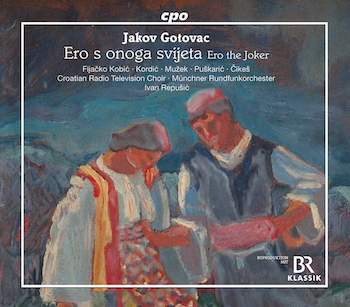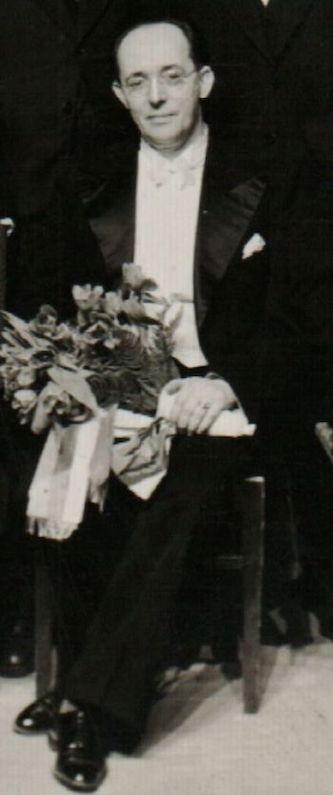Opera Album Review: Croatia’s Best-Known Opera, “Ero the Joker” — Folk Fun and Games
By Ralph P. Locke
Croatia’s best-known opera is like The Bartered Bride or a lighter-spirited Porgy and Bess: tuneful, engaging, and stageworthy.
GOTOVAC: Ero the Joker
Valentina Fijačko Kobić (Đula), Jelena Kordić (Doma), Tomislav Muzžek (Mića, known as Ero), Ljubomir Puskarić (Sima), Ivica Čikeš (Marko)
Croatian Radio Television Choir, Munich Radio Orchestra/ Ivan Repušić
CPO 555080-2 [2 CDs] 112 minutes
Click here to purchase or hear the beginnings of each track.
 A country that has long been considered a backwater often ends up looking to its creative artists to come up with a work that expresses its (supposed) national character, its people’s aspirations. A work that, with luck, will be that land’s calling card in the larger world.
A country that has long been considered a backwater often ends up looking to its creative artists to come up with a work that expresses its (supposed) national character, its people’s aspirations. A work that, with luck, will be that land’s calling card in the larger world.
Henry Wadsworth Longfellow provided something of the sort with The Song of Hiawatha (1855): an epic poem that spelled out an origin myth for the United States.The work ends with the Native American chief welcoming a Christian clergyman (“the Priest of Prayer, the Pale-face”) and other European “guests” and urging his own people to “listen to the truth they tell you,” as he, in his canoe, drifts off into the sunset. The poem became a major hit around the world, contributing to the image of a benign United States of America.
In the musical arena, opera has been a major genre for this kind of national self-definition and self-promotion. Czech-speakers have Smetana’s The Bartered Bride (a staple even today in the international operatic repertory), Poles Moniuszko’s Halka (from which Piotr Beczała sings an aria in a recital currently being streamed by the Met), and Hungarians Erkel’s Bánk Bán. Many American composers in the twentieth century aimed at achieving something similar, two particularly successful instances being Porgy and Bess and Kurt Weill’s Street Scene.
Well, it turns out that the Croatians have two major operas in their poker hand. One is Nikola Šubić Zrinjski (1876), a patriotic historical opera by Ivan Zajc (sometimes spelled Zaytz), who had studied for five years at the Milan Conservatory. (A fine recording of that opera, too, has just been released on CD.)
The other, and more widely known, is Jakov Gotovac’s Ero the Joker (Ero s onoga svijeta). Ero is now available in its first major recording. It turns out to be not entirely unfamiliar.
I figure that any opera in which at least one aria or duet that has become a standard item on its own is worth looking into, as I argued with regard to Gounod’s Le Tribut de Zamora and Korngold’s Das Wunder der Heliane. But what about a work that has gifted an instrumental number to the repertory? That’s less obvious, since one can surely concoct an attractive overture or dance number without quite mastering the special challenges of writing skillfully and attractively for voice and creating a dramatic arc across two hours or so in the theater. Reznicek’s marvelous overture to Donna Diana might, or might not, predict a major opera that we should look into.
So I was wondering about Ero the Joker, since the movement in it that is called a kolo (a kind of folk dance done in a circle, or several concentric circles) has been recorded separately several times in purely orchestral versions (e.g., by Rudolf Kempe in 1961, elegantly, with the Vienna Philharmonic). That number remains ever-fresh for its engaging mixture of lilting melodies, propulsive dance rhythms, and nicely varied orchestration.
(Don’t confuse it with Gotovac’s Symphonic Kolo, which is an independent and longer piece, likewise attractive and colorful. Both of his orchestral kolos are on this recording.)
Well, here we have the entire Ero opera (1927; first performed in Zagreb, 1935). It is sometimes referred to by its German title, Ero der Schelm, because the work has had an active life in German and Austrian opera houses across the decades. Indeed, the booklet essay tells us that it has been performed over 700 times in numerous lands, including England and Italy. Three German-language stagings are noted with particular pride in the booklet: Karlsruhe (1938), Berlin (1940), and Munich (1942, featuring such major performers as tenor Julius Patzak and Ludwig Weber, conducted by Heinrich Hollreiser). Note the dates! That these performances occurred at the height of the Nazi era goes unmentioned by the patriotic booklet-writer.
Gotovac, the composer of Ero the Joker, was active as conductor as well as composer. Ero proves to be immensely attractive, much along the lines of his two orchestral kolos. The plot is relatively simple, involving a young man who appears out of nowhere and jokes that he has “come from the other world,” that is: “dropped down from Heaven.” (This is what the end of the opera’s title means in Croatian, not “the joker.”)
The plot that spins out has to do with whether Ero (whose name is actually Mića) and Đula will get to marry, in spite of objections from Đula’s father, who is a wealthy farmer, and her harsh stepmother Doma.Đula gets some sad music along the way, but Ero/Mića finally reveals his identity. He is wealthy himself, from a neighboring town, but wanted Đula to love him for himself and not for his money. He and Đula get to marry after all.

Jakov Gotovac with the National opera of Bulgaria, Sofia, 1940. Photo: Wiki Commons.
The music is straightforward in harmony and phrase structure, and there are elements of distinctive folk style throughout, including intriguing syncopations within numbers that otherwise maintain a single steady rhythm. The booklet draws attention to some augmented seconds in the miller Sima’s melodic lines as evidence that Croatia was close to extensive lands in southeastern Europe (from Greece up through Romania) that had been controlled for hundreds of years by the Ottoman Empire.
For the rest of us, the opera will not feel remotely Middle Eastern but rather more like Smetana’s The Bartered Bride—jolly choruses and all—but updated with minor-second dissonances, relentless ostinatos, and other self-consciously modern accoutrements. I was reminded at times of Orff’s Carmina burana, but that work was composed later than Ero (1935-36).
The most “Eastern” number, for my taste, was the opening of the marketplace scene (beginning of Act 3), which seems closely modeled on Borodin’s “Polovtsian Dances” from Prince Igor. (The Borodin work has had a long history of performances in Yugoslavia, as testified by this famous recording recently re-released.) By the way, in Gotovac’s opera, the kolo ends the work in a spirit of celebration, the chorus joining in with the orchestra.
The performers include Croatian soloists, a Croatian chorus, and one of Germany’s leading orchestras under its principal conductor, Croatian-born conductor Ivan Repušić. I greatly admired his spiffy work in Verdi’s I due Foscari and Attila and Puccini’s La rondine.
We hear a concert performance from May 19, 2019. Every note seems to be in place and doing what it needs to do. The vocal parts make only modest demands (as is true of many comic operas), and the singers show admirable control throughout, as well as a clear understanding of the words—lots of slight tempo adjustments to reflect some point that a character is making. The sound is caught with clarity and warmth, thanks to the famously fine acoustics of Munich’s Prinzregenten Theater.
I can imagine Ero holding the stage again, perhaps especially if translations can be made that catch the work’s alternation of touching and lighthearted moments. There’s even an episode in which two male characters exchange cloaks, in the manner of Don Giovanni and Leporello.
The booklet helpfully provides a good English prose-translation and a fine singing version in German. This will enable those of us whose Croatian is a bit weak to grasp the opera the first time through.
Bravo, CPO! Opera houses and college opera programs, are you paying attention? Time to start thinking about new repertory for “after the pandemic”!
Ralph P. Locke is emeritus professor of musicology at the University of Rochester’s Eastman School of Music. Six of his articles have won the ASCAP-Deems Taylor Award for excellence in writing about music. His most recent two books are Musical Exoticism: Images and Reflections and Music and the Exotic from the Renaissance to Mozart (both Cambridge University Press). Both are now available in paperback; the second, also as an e-book. Ralph Locke also contributes to American Record Guide and to the online arts-magazines New York Arts, Opera Today, and The Boston Musical Intelligencer. His articles have appeared in major scholarly journals, in Oxford Music Online (Grove Dictionary), and in the program books of major opera houses, e.g., Santa Fe (New Mexico), Wexford (Ireland), Glyndebourne, Covent Garden, and the Bavarian State Opera (Munich). The review first appeared, in a somewhat shorter version, in American Record Guide and is posted here by kind permission.
Tagged: BR Klassic, CPO, Ero the Joker, Ivan Repušic

